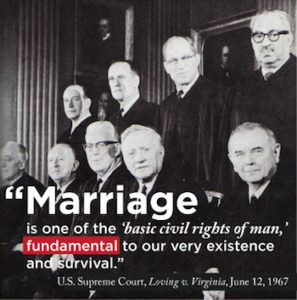
On this date in 1967, the U.S. Supreme Court decided Loving v. Virginia.
That same year, on April 10, Virginia's constitutional system was argued, which prevented marriages between persons solely based on racial classifications. This provision was held to violate the Equal Protection and Due Process Clauses of the Fourteenth Amendment. In June 1958, two residents of Virginia, Mildred Jeter, a Black woman, and Richard Loving, a white-American man, were married in the District of Columbia, which did not violate D.C. laws. Shortly after their marriage, the Lovings returned to Virginia and established their marital residence in Caroline County.
In October 1958, the Circuit Court of Caroline County Grand Jury indicted the Lovings for violating Virginia's ban on interracial marriages. On January 6, 1959, the Lovings pleaded guilty to the charge and were sentenced to one year in jail; however, the trial judge suspended the sentence for 25 years on the condition that the Lovings leave the state and not return to Virginia together for 25 years. In a unanimous decision, the court held that distinctions drawn according to race were generally “odious to a free people.” It was subject to “the most rigid scrutiny” under the Equal Protection Clause.
The Virginia law, the court found in 1967, had no legitimate purpose "independent of invidious racial discrimination." The court rejected the state's argument that the statute was legitimate because it applied equally to Blacks and whites and found that racial classifications were not subject to a "rational purpose" test under the Fourteenth Amendment.
Historic U.S. Cases 1690-1993:
An Encyclopedia New York
Copyright 1992 Garland Publishing, New York
ISBN 0-8240-4430-